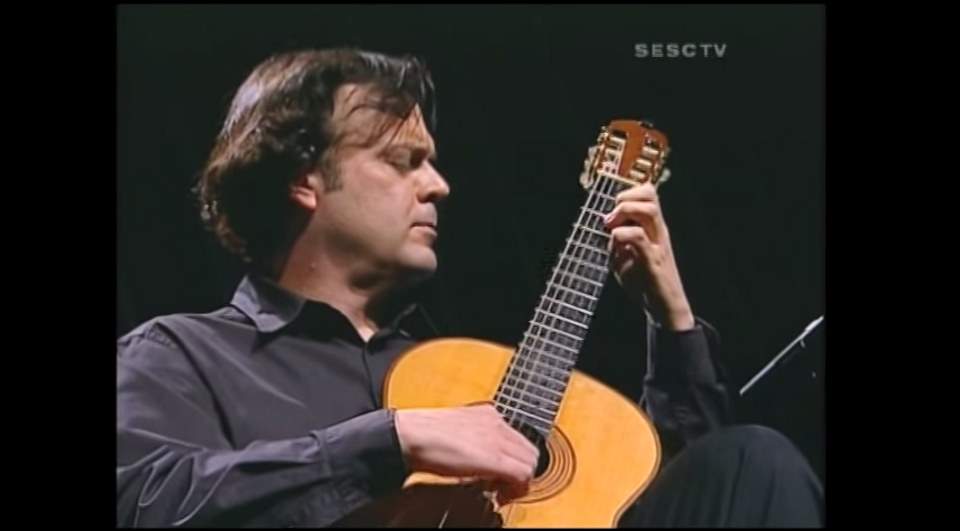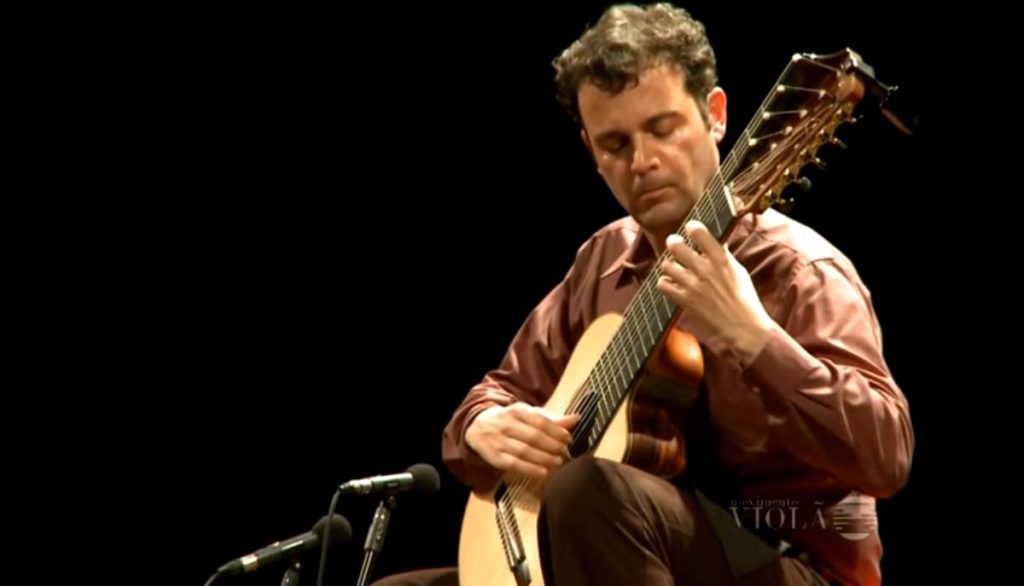Brazilian classical guitarist Paulo Martelli plays Koyunbaba, the Italian guitarist and composer Carlo Domeniconi’s most well-known 1985 piece. Koyunbaba is a small village in the Bodrum district of Muğla, Turkey. The name “koyunbaba” is Turkish and literally translates as “sheep-father” (koyun-baba), or “shepherd”. One of the best interpretations of the piece. Recorded at SESC Vila Mariana (São Paulo, Brazil) on August 27, 2010, for Movimento Violão – SESC TV.
Guitar made by Sergio Abreu (n.06) – Strings: Augustine Regal
Carlo Domeniconi’s Koyunbaba
Domeniconi is most well known for his 1985 piece Koyunbaba. Koyunbaba is a small village in the Bodrum district of Muğla, Turkey (I was born in Muğla). The name of the piece is Turkish and literally translates as “sheep-father” (koyun-baba), or “shepherd.” Some sources also translate it as “the spirit of the sheep”.
It can also refer to many other things, including a 15th-century mystical saint-like figure whose grave is decorated with colored bits of cloth by Turkish villagers seeking his help with family problems. “Koyunbaba” is also the family name of his descendants, who still reside in the area, and the name of a wild, dry region of Southwest Turkey, near Bodrum. According to local legend, the area is seemingly cursed – numerous people who have attempted to rent or purchase the land from the Koyunbaba family have died or fallen ill.
Domeniconi has referred to two specific examples: one was a German woman who wanted to keep the area in its natural and unspoiled state but was soon stricken with cancer. The other was one of three sons of the Koyunbaba family who suddenly sold some of the lands but then hanged himself.
The village’s name comes from the Koyunbaba family.
Koyunbaba is composed for solo guitar and is divided into four movements. Each movement portrays different moods and offers varying levels of technical challenge for the guitarist.
Tuning: One of the distinguishing features of the piece is its use of scordatura or alternative tuning. Instead of the conventional E-A-D-G-B-E tuning of the classical guitar, “Koyunbaba” employs C#-G#-C#-G#-C#-E tuning. This unique tuning gives the piece its characteristic resonance and modal color.
Crossover of Styles: Domeniconi’s blending of Western classical music techniques with Eastern music traditions, especially from Turkey, is evident in “Koyunbaba”. The piece contains elements of Turkish folk music and modal scales that are characteristic of Middle Eastern music.
Popularity: Since its composition, “Koyunbaba” has become a staple in the classical guitar repertoire. Its evocative melodies, combined with its technical challenges, have made it a favorite among both audiences and guitarists.
Many guitarists from around the world have recorded “Koyunbaba”, and it’s also a popular piece for guitar competitions and recitals. It stands as a testament to Domeniconi’s ability to craft compositions that are deeply rooted in tradition yet have a universal appeal.
Paolo Martelli

Described as “one of the best guitarists of his generation” by Soundboard Magazine and Guitar Player Magazine, Paulo Martelli has been revolutionizing the guitar scene of his home country of Brazil at the same time that he has been establishing international recognition as an exceptional performer and prolific producer.
An acclaimed performer as well as the winner of several international competitions and awards, Mr. Martelli has appeared as a soloist and with distinguished orchestras and chamber music ensembles in Brazil and abroad, including the Metamorphosen Chamber Orchestra, Grammy Award-winning violinist Mark O’Connor, and the Campinas Orchestra for the Brazilian première of Francisco Mignone’s Concerto for Guitar and Orchestra.
An accomplished recording artist, Mr. Martelli has released four albums acclaimed for their “perfection” (Classical Guitar Magazine, UK), “solid and brilliant technique” (Soundboard Magazine, USA), and “impeccable musicality” (Gendai Magazine, Japan). In 2012, Paulo premiered Lendas Amazônicas, a fantasia concertante for two guitars and orchestra written by legendary Brazilian guitarist Marco Pereira, and recorded the première of this work live for SESCTV performing alongside the composer. His interest and dedication to expanding the repertoire of the guitar have led numerous composers to dedicate new works to him, including Sérgio Assad, Geraldo Ribeiro, Douglas Lora, Marco Pereira, João Luiz Lopes, and Mark Delpriora.
In recent years, Mr. Martelli has dedicated himself to becoming a master of the 11-string guitar. His lyrical voice and effortless technique along with his development of new works for the instrument have placed him as one of its foremost virtuosos. His innovative arrangements of works by J. S. Bach for 11-string guitar have been praised by critics as “outstanding” and “miraculous.”
As a producer, Paulo Martelli created Movimento Violão, an international concert series that for over ten years has presented some of the world’s finest guitarists and showcased Brazil’s finest up-and-coming musicians. Each season of Movimento Violāo is broadcast nationwide on Brazilian television and released on CD and DVD, presenting artists with new standards of excellence while also producing an unparalleled archive for future generations. In 2011 Mr. Martelli premièred Movimento Violão in the United States with a solo performance at the Kennedy Center, which was webcast live and streamed over the internet on-demand.
Along with his work as a performer, Paulo Martelli is widely respected as an educator and scholar, having held the chair of the guitar department at the University of Ribeirão Preto, Brazil for several years. Also committed to private teaching, he has prepared young talents for successful auditions in top music schools such as The Juilliard School and Manhattan School of Music.
In 1999, in recognition of his deep commitment to music education, the Brazilian Ministry of Culture awarded him the “Virtuoso Scholarship” which allowed him to develop studies in tablature systems at the Manhattan School of Music in New York City. In 2000, he was a recipient of the Andrés Segovia Award, one of the highest honors in the field of classical guitar.
Paulo Martelli holds a master’s degree from The Juilliard School and a professional studies diploma from the Manhattan School of Music. He presented his New York City debut recital at Weill Recital Hall at Carnegie Hall in 1995, where he has returned to perform on several other occasions.
Mr. Martelli began studying guitar at the age of ten, under the guidance of Francisco Brasilino and Henrique Pinto. Later, he became a mentee of legendary virtuoso Sérgio Abreu. He is currently a faculty at the Municipal Music School of São Paulo (EMESP).
Sources
- Paulo Martelli’s biography on albertaugustine.com

